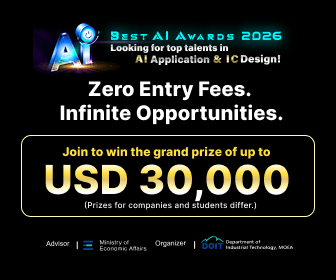The rise of 5G, 8K, Internet of Things (IoT) applications is turing healthcare from a "service" into an "industry" in Taiwan, where companies, the government and academic circles are keen on developing smart healthcare.
According to Ted Chang, CTO and VP of Quanta Computer and head of Quanta Research Institute (QRI), a paradigm shift is really important for the development of the industry. While innovations are inspiring, the challenge is how the newcomers can surpass the predecessors, he said, adding that very often, cross-domain collaborations can create greater innovations and possibilities.
As with smart healthcare, Chang stated that this challenge is an international one. There were already plenty of issues even before COVID-19, such as the aging population, medical resource shortage, and medical service gap between urban and rural areas. Therefore, digital technology is required to connect each section to build a complete medical service network. On top of all that, the disruptions caused by uncertainties like weather, environment, and the pandemic have further accelerated the use of digital technology.
For the healthcare system, the barrier lies in how to provide the AI with the vital data collected by the IoT devices for training, as well as deployment to the end user for diagnosis. From the industry's perspective, this is the manifestation of turning standardized products into data thinking.
In addition, digital twins are also a key component of smart healthcare. Chang pointed out that human is an extremely complex system. If the neural network is fed with large amounts of data, it will help create a digital twin even closer to the real human body. Integration of different data can create different models of digital twins.
Boeing adopted this digital approach when making the Boeing 777. By designing and testing the plane in a digital space, Boeing was able to reduce the high costs it might have encountered in physical tests. Similarly, if each organ can have a digital twin in the future, medical practices such as applying medicine can be more efficient and accurate.
Digital healthcare has been among Taiwan's initiatives at APEC. As the Taiwanese representative in the APEC Business Advisory Council (ABAC), Chang said that the development level of each economy is different. How to integrate each other's technology is a direction everyone needs to think towards. Besides, after the pandemic, health practices and business models are all facing change. Identifying the reasonable and required technologies will be the next focus.

Ted Chang, CTO and VP of Quanta Computer and head of Quanta Research Institute (QRI)
Photo: DIGITIMES Asia, August 2022


